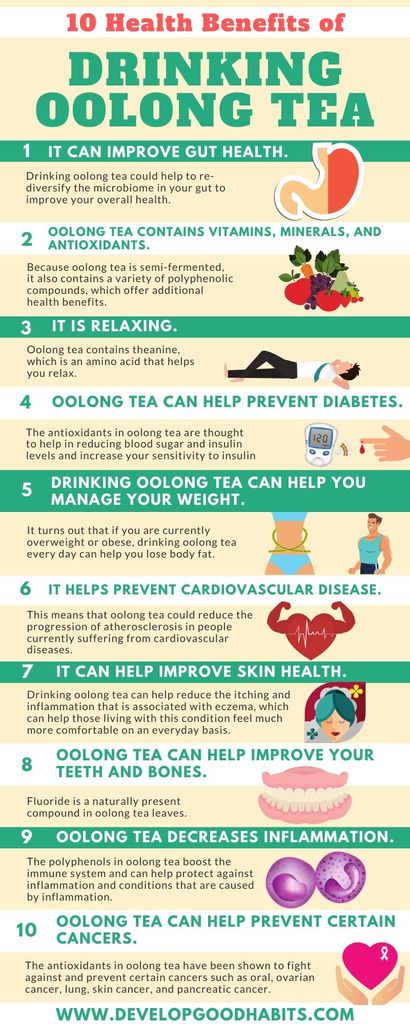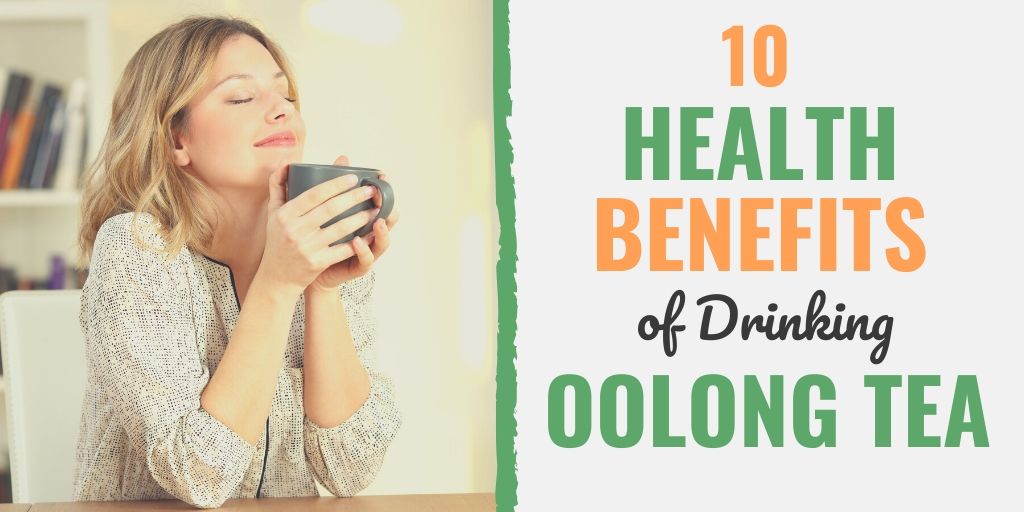Do you enjoy tea? If you do and you have not yet tried Oolong tea, you might be missing out. This is before we even get into the many health benefits of Oolong tea that we will discuss in this article.
Aside from water, tea is the most widely consumed beverage worldwide. Surprisingly, only 2% of tea is oolong, but it’s worth it to incorporate this variety into your tea routine.
Oolong tea is in the same family as black teas and green teas, as they all originate from the Camellia Sinesis plant. However, oolong tea differs from the others in the way it’s processed. Tea leaves contain enzymes that create oxidation, which is a chemical reaction. Oxidation is responsible for turning green tea leaves a rich, dark color.
Oolong tea only goes through a partial oxidation process, while green tea goes through little or no oxidation and black tea goes through the entire oxidation process. So in terms of oxidation, oolong tea falls somewhere in the middle of green and black tea.
So how does this impact the end result?
Because black tea goes through a long oxidation process, it has a bitter taste in the end. Most oolong teas are oxidized somewhere between 8% and 80%. The less oxidized oolong tea is, the more it provides you with an airy floral flavor that is light-bodied. Heavily oxidized oolong teas have a deeper, earthy flavor that is fuller bodied. Along with its unique flavor, oolong tea also offers unique health benefits that make it a worthwhile option to discover.
In this article, we will look at 10 well-studied health benefits of drinking oolong tea.
10 Benefits of Oolong Tea
1. It can improve gut health.
Many people turn to probiotics to maintain or improve their gut health, but oolong tea can also boost the health of your gut microbiome and your digestion. Because oolong tea is slightly antiseptic, it aids the digestive tract by inhibiting the growth of bad bacteria in your gut. It also has an alkalizing effect, which helps decrease acid reflux and ulcers for those who have an inflamed gut.
Further, one study found that the polyphenols in oolong tea can regulate intestinal flora and generate short-chain fatty acids, which contributes to the improvement of intestinal health.
Because of these polyphenols, people who drink oolong tea have a more diverse gut flora. Research shows that the more diversity you have of microbes in your gut, the lower your risk is for developing diseases and allergies. And, due to generations of industrial agriculture and processed food consumption, certain bacteria that are needed for optimal health are now extinct in modern society. Drinking oolong tea could help to re-diversify the microbiome in your gut to improve your overall health.
2. Oolong tea contains vitamins, minerals, and antioxidants.
Polyphenols are the antioxidant that most people are looking to consume when they’re drinking tea for health-related reasons. Some of the polyphenols that you can find in oolong tea include theaflavins, thearubigins, and EGCG, which are responsible for many of oolong tea’s health benefits. The polyphenols in oolong tea can help treat digestion problems, help with weight management, diabetes, neurodegenerative diseases, and heart diseases. They also have strong anti-cancer properties.
The antioxidants in tea can also help fight free radicals in your body. Free radicals are unstable atoms in your body that can cause damage to your cells, resulting in disease and aging. As you age, your body loses its ability to combat the impacts of free radicals. This leads to degenerative, age-related diseases such as Alzheimer’s, cancer, cataracts, hair loss, and diabetes. By consuming antioxidants, you will reduce the impact of free radicals and therefore hinder your body’s natural aging process.
In addition to the antioxidants in oolong tea, the nutrients are as follows:
It also contains a variety of minerals such as carotene, calcium, copper, selenium, and vitamins A, B, C, E and K. Additionally, oolong tea contains detoxifying alkaloids such as folic acid and niacinamide. Because oolong tea is semi-fermented, it also contains a variety of polyphenolic compounds, which offer additional health benefits.
3. It is relaxing.
Oolong tea contains theanine, which is an amino acid that helps you relax. In fact, theanine has been found to regulate aspects of human brain function without causing drowsiness. This means that oolong tea might be a great option for you if you tend to be anxious during the day but still have to stay alert while you’re working.
It is also ideal for those who need to calm down and focus. In fact, one study found that people who took 100mg of theanine made fewer errors in a task that required their attention than those who took a placebo.
Theanine can also boost the amount of serotonin and dopamine that is excreted from your brain, which can help improve your mood and emotions, help you get better sleep, and modulate your body’s production of cortisol. All of these factors together can help you handle stress better on an everyday basis.
4. Oolong tea can help prevent diabetes.
The antioxidants in oolong tea are thought to help in reducing blood sugar and insulin levels and increase your sensitivity to insulin. With improved blood sugar control, you’re less likely to develop type 2 diabetes.
In fact, studies have shown that people who drink 24 ounces of oolong tea per day have a 16% reduced risk of developing type 2 diabetes. Additionally, a study completed in Taiwan found that oolong tea is an effective supplement when it’s used with traditional hypoglycemic drugs to help treat type 2 diabetes.
For those who are already diagnosed with type 2 diabetes, drinking oolong tea can reduce your blood sugar levels by up to 30%.

5. Drinking oolong tea can help you manage your weight.
In one study that was published in the Journal of Nutrition found that mice who consumed oolong tea extract while on a high sugar, high fat diet gained less body fat than mice who ate the same diet but didn’t consume oolong tea extract. Also, those who were given the tea extract consumed fewer calories overall, suggesting that oolong tea can decrease your appetite.
Studies have also been done on humans to look at the effects of oolong tea on body weight. It turns out that if you are currently overweight or obese, drinking oolong tea every day can help you lose body fat.
Furthermore, the polyphenols that are found in oolong tea can boost your metabolism by blocking the enzymes that create fat. And, because oolong tea contains a bit of caffeine, it can help boost your energy and help you get more physical activity during the day to increase the number of calories you’re burning.
6. It helps prevent cardiovascular disease.
Research has uncovered a relationship between oolong tea consumption and a reduced level of cholesterol. This study followed nearly 77,000 people for five years who drank oolong tea every day. They found that those who drank at least 8 ounces of oolong tea per day had a lower risk of having high levels of overall cholesterol, triglycerides, and LDL cholesterol.
Further, a study completed in Japan found that drinking oolong tea can increase the levels of adiponectin in your blood. Adiponectin is a protein hormone that helps regulate blood sugar levels and the breakdown of fatty acids. Having low levels of adiponectin increases your risk of developing coronary artery disease. This means that oolong tea could reduce the progression of atherosclerosis in people currently suffering from cardiovascular diseases.
7. It can help improve skin health.
While it may take up to two weeks to see improvement, research has shown that drinking oolong tea can help improve eczema that hasn’t been improved by other methods of treatment. Specifically, drinking oolong tea can help reduce the itching and inflammation that is associated with eczema, which can help those living with this condition feel much more comfortable on an everyday basis.
Additionally, since oolong tea can fight free radicals, it can reduce allergic reactions that lead to eczema or atopic dermatitis. Oolong tea’s antioxidants also help make your skin appear to be more radiant and reduce signs of aging such as wrinkles and age spots. In addition, the polyphenols found in oolong tea can help protect against damage caused by the sun’s ultraviolet rays.
The antioxidants that are found in oolong tea can also aid in the treatment of acne and blemishes when it is used topically. To do this, simply brew the tea in hot water and use the steeped tea to clean your face as soon as you wake up in the morning.

8. Oolong tea can help improve your teeth and bones.
Fluoride is a naturally present compound in oolong tea leaves. Fluoride is a mineral that helps prevent enamel loss and tooth decay by replacing calcium and phosphorus that your teeth lose over time. Fluoride helps keep your teeth hard so they aren’t easily damaged by food or everyday wear and tear. And, because the fluoride that is found in oolong tea is naturally occurring, it can also help prevent cavities.
Oolong tea can also help remineralize your bones, which will help them maintain their strength. Stronger bones will help reduce your risk of experiencing a break or fracture and reduce your long term risk of developing osteoporosis. This rings especially true for women who are going through menopause. During menopause, women’s bones get increasingly weak, which can lead to arthritis and osteoporosis.
9. Oolong tea decreases inflammation.
The polyphenols in oolong tea are to thank for this as well. These compounds (that come from plants) boost the immune system and can help protect against inflammation and conditions that are caused by inflammation.
When you reduce chronic inflammation in your body by changing your diet, you are taking one of the biggest steps toward preventing all types of diseases. The antioxidants in oolong tea target specific genes that cause inflammation and signal them to reduce inflammation. In fact, many people turn to drinking oolong tea to help reduce inflammation in their body rather than taking supplements such as EGCG because it is much less expensive and equally as effective.
10. Oolong tea can help prevent certain cancers.
The antioxidants in oolong tea have been shown to fight against and prevent certain cancers such as oral, ovarian cancer, lung, skin cancer, and pancreatic cancer. The antioxidants, especially EGCG, is able to scavenge free radicals and can protect cells from DNA damage.
The polyphenols that are found in oolong tea can also stop tumor cells from multiplying and promote cell death in those that may become malignant. The catechins in oolong tea have also demonstrated an ability to inhibit tumor cell invasiveness. Tea can also help detox your body with its enzymes, which can help fight the development of tumors.
Final Thoughts
Whether you prefer to drink your tea hot or cold, oolong tea is a great option to keep on hand if you want to benefit from its rich antioxidants, vitamins, minerals, and calming properties.
The health benefits of oolong tea are numerous, and drinking just one cup of this special tea can go a long way when it comes to your overall well being.

Connie Mathers is a professional editor and freelance writer. She holds a Bachelor's Degree in Marketing and a Master’s Degree in Social Work. When she is not writing, Connie is either spending time with her daughter and two dogs, running, or working at her full-time job as a social worker in Richmond, VA.


